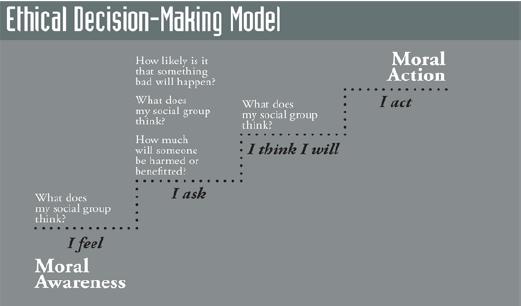Business Ethics - Moral Reasoning
What is Morality?
In a broad sense, morality is a set of rules that shapes our behavior in various social situations. It is more sensitive doing the good instead of the bad, and therefore, it establishes a level of standard for virtuous conduct.
The Corporate Governance Code of Coca Cola
Coca Cola makes it clear that the company is inclined towards a good business morality. Its corporate governance code starts with these starting announcements.
“At the Coca-Cola Company, we aim to lead by example and to learn from experience. We set high standards for our people at all levels and strive to consistently meet them. We are guided by our established standards of corporate governance and ethics. We review our systems to ensure that, we achieve international best practices in terms of transparency and accountability. The foundation of our approach to corporate governance is laid out in our Corporate Governance Guidelines and in the charters of our Board of Directors’ committees.”
Where Does Morality Come From?
The principles of moral ethics can be injected into any business. Ethical businesses recognize the power of conducting businesses in socially responsible ways and they realize that doing so leads to increase in profits, customer satisfaction and decrease in employee turnover.
Business ethics is concerned with applying a moral framework to the way organizations do business. From dealing with human resources issues to sales and marketing policies, ethical viewpoints can shape and change the way businesses operate.
Business ethics has both normative and descriptive elements −
The normative part of business ethics has to do with understanding, how the behavior you and your employees exhibit in relation to cultural issues or social upbringing. The key to normative ethics for business owners is to understand how personal beliefs affect the choices made as a business owner.
The descriptive part of business ethics, on the other hand, is related to how you incorporate "best practices" into your organization's policies and procedures.
Henry Ford on Business Morality
“There is one rule for the industrialist and that is: make the best quality goods possible at the lowest cost possible, paying the highest wages possible.”
The Meaning of Moral "Justification"
"Justification" in terms of business ethics can be portrayed in two different ways. In business ethics, do the means justify the ends, or do the ends justify the means?
Is it better to have a set of rules telling you what you ought to do in a particular situation, or should one worry more about how things are going to end up and do anything to reach that goal?
Let’s take an example. John ran a medicine business in California, USA. His herbal product used to stop nausea and vomiting for chemo patients. California regulators had allowed his business entity, but federal agencies had not approved it. Therefore, selling it on national level was breaking the law. On the other hand, not selling could consign his clients to suffering. So, when federal agents came knocking on his door, he had to make a decision.
If the means justify the ends − If he follows the rules no matter what the consequences are, then the agents ask John directly whether he is selling the medicine and the ethical action would be to admit it.
If the ends justify the means − If your ethical interest focuses on the consequences of an act instead of what you actually do, then the ethics change. Therefore, when agents ask him whether he is selling, he has a reason to lie.
The Importance of Context
When we ask questions, such as "Which is more important, telling the truth or preventing harm?” often the context is more important. Context can be determined from factors such as time and place, the nature of the situation, other people's expectations, and the relevant history.
To understand the context, let’s assume you are a resident of Nazi Germany, in 1940. A family of Jews is hiding in your attic. The German police come searching that particular family of Jews. In such a case, preventing harm is clearly more important than telling the truth.
The Importance of Relationships
Business morality largely depends on business relationships. Our rights and obligations spring largely from relationships. These include our relationships with shareholders, customers, and general stakeholders.
These relationships can offer moral reasons for particular actions. For example, relationship with your shareholder means moral duties to them (such as to offer profits and be transparent) which you do not have for non-stakeholders.
Moral Questions are not Distinct
Moral problems are not a separate, special or particular domain to that is followed only on special occasions. Moral issues are present all the time. Most decisions that people make usually have a degree of moral importance. The challenge is in recognizing that fact. Morality is often finding the best choice overall, taking into consideration the result, economics, and technical (e.g., finances) appropriateness, and balancing them against other sorts of business values, which the organization follows.
Moral Decision Making
There is no crafted-out formula or algorithm for moral decision-making. Good moral decision-making includes knowledge of the facts, and careful consideration of the moral values (principles) relevant to a given situation. Importantly, sensitivity and awareness of the range of interests are also highly sought in moral decision-making process.
Getting the Facts Straight
To make a good decision, we have to get the facts of the situation straight. In some difficult cases, additional facts may make the correct course of action apparent. These facts are available through science, or from the experiences of people who have studied the situation for a long time.
The Importance of Moral Sensitivity
Sensitivity to the moral issues involved in everyday activities is important for moral decision-making. Sometimes, we may take the help of instincts for taking trivial decisions. For example, most of us do not require an impetus to avoid lying in most cases.
For a problem with moral importance, the first and perhaps the most important step in resolving the problem lies in finding out the range of considerations. This includes an awareness of the parties going to be affected, sensitivity to the set of values or principles probably to be applied, and a sensitivity to the factors that influence the decision.
The Role of Discussion in Morality
If morality in business ethics is primarily about shared values, then business discussion, which can take many modes of communication with various parties, takes a central place in moral business-decision making. In many cases, more than one party may often be involved, and we should include others in our decision-making processes.

Discussion as a Means of Consensus-Building
Discussion is important in moral business-decision making, as it is often important that others around us agree with or understand our decisions. For example, the consumer products industry often collects feedback through surveys and marketing gigs to take the business discussion forward.
Discussion as a Way of Learning from Others
We can learn from discussing moral questions with others. Others can provide valuable insight or experience. For example, the software makers can have valuable feedback from users. That is why they beta test their products before launching a product.
Guide to Moral Decision Making
There is no formula for making good medical diagnoses, or for giving good legal advice. All of these involve significant elements of experience and sensitivity.
Experience and sensitivity will not guarantee that a good decision is made, but they help assure that decisions are not hasty, or lacking in sufficient consideration of ranges of problems.



